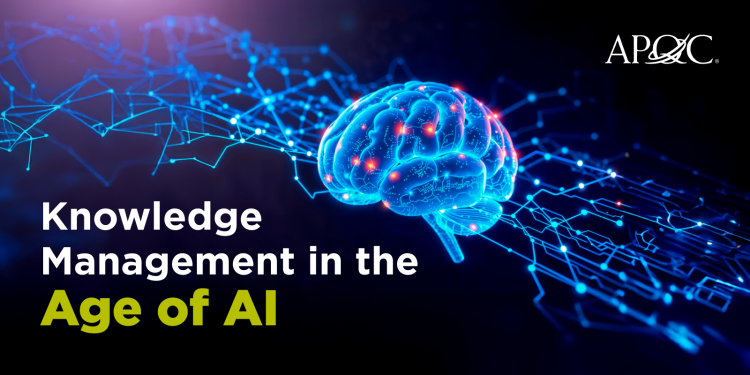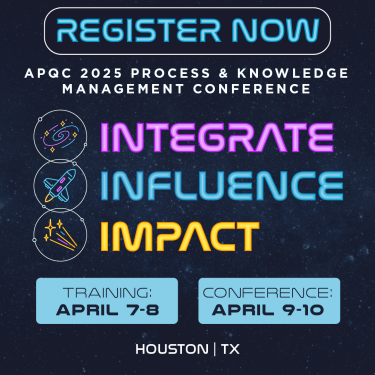
Looking forward to seeing you all in 3 weeks at APQC’s 2025 Process and Knowledge Management Conference! This marks my 30th year of participating in APQC conferences, and each one has brought some truly #memorablemoments. I hope you will join me to create #newmemories. To get us prepared, here are a few themes and key lessons from our conferences that have been foundational to my growth as a knowledge management (KM) practitioner. These insights have significantly shaped the field of KM and helped us learn how to improve our partnerships with other disciplines like #processmanagement and #learning and, finally, bring us to where we are today.
A heartfelt thank you to our members, global network, clients, and experts who have joined us year after year, and contributed to the discipline we love. Your shared knowledge and learnings have been invaluable. I am #grateful! Now…let’s take a walk down #KM and #PM #memorylane.
1995 – Move Beyond "Knowledge for Knowledge's Sake"
The goal of KM is not to share knowledge for its own sake, although that is a valuable byproduct of the process. Start with the business problems or opportunities. Identify the processes that seem to be the source of the “knowledge” problem. The value proposition for KM ranges from fixing a business process and eliminating repeated customer complaints, mitigating the risk of mistakes from knowledge loss due to retirement of experts, or supporting people’s daily work by giving easier access to technical knowledge of experts.
1998 – Knowledge is Sticky
Without a systematic process, dedicated people, and a robust infrastructure, it will not flow. It is a mistake to adopt a KM approach (like communities of practice or an expertise locator system) without first understanding the flow you are trying to enable. For value to be recognized, you must get to the step of “knowledge use”. It’s where magic happens, and the value is recognized.
2003 – Measure to Prove Value and Impact of KM
For many years, the intangible nature of knowledge itself had us assuming that the effects of KM would also be intangible. Not the case! Research and stories from APQC members found that organizations that effectively measure the impact of KM rigorously achieve a healthy return on investment, often as much as $2 (US) or more for every $1 (US) spent per participating employee. KM measurement is the calculation of the relationship between KM adoption/participation and the generation of business value, e.g., employee hours saved; accelerated time-to-competency for new hires; cost savings or avoidance; new revenue generation.
2013 – The New Edge in Knowledge
Little did we know how much KM would really change the way we did business. So honored to co-author with the sage (and my mentor) @carlaodell. Writing the book helped us #reinventKM and look at our capabilities with a more mature and focused lens on our processes, approaches, and tools. We talked about culture, culture, and more culture! Using all the latest and greatest breakthroughs in understanding how to #influence people’s habits, #integrating KM processes into business process, and partnering with our technology teams to apply the tools of the time, we begin to crack the code on “embedding knowledge (and KM) into the flow of work”.
KM was and is about enabling what most people want to do naturally: share what they know and learn from others. The barriers to sharing are often structural: there is not enough time, the process is cumbersome, they do not know the source or the recipients and are not sure they can trust the information, and they know instinctively that tacit knowledge is richer than documented explicit knowledge.
Creating a knowledge-sharing culture is the result, rather than the prerequisite, of a successful KM strategy.
2017 – KM in the Age of Digital Transformation and Deep Work
Empowering the knowledge worker is getting fast-tracked. Transformation is being fueled by data and the powerful machines and software algorithms to make sense of it. Emerging technologies “see” patterns humans could never see. What was once dark data hidden around our organizations is now visible.
KM is how organizations learn and remember and antidote to corporate amnesia. KM is an antidote to corporate amnesia. In the same way, now big data and analytics are the antidote to pattern blindness. Common terms we agreed on to accelerate the learning curve included: digital breadcrumbs, machine learning, predictive analytics, recommendation systems, artificial intelligence (AI), chatbots, and digital assistance.
We also focused on the ability to cope with the pace of change. The “Deep Work Hypothesis” was introduced. The ability to perform deep work is becoming increasingly valuable in our economy. But it is also becoming increasingly rare. Therefore, if you cultivate this skill, you’ll thrive. Thanks to Author of Deep Work, Study Hacks Blog - Cal Newport
2023 – Knowledge, Process, AI – Better Together
The “era of AI and GenAI” is here and we’d better embrace it. Processes, tools, and resources only work if people use them - and when change is the only constant, rapid adoption is critical. Knowledge is information in action and process drives action. Therefore, knowledge management and process management must #integrate their toolset and leverage the power of technology to drive and support the pace of change and learning.
Play is a mindset of approaching life with an attitude of being comfortable with trial and error. The scientific method of trial and error—trying something, seeing how it works, and iterating—is actually play. Collaboration is the “play” that enables teams to solve problems more quickly, decrease reinvention and duplicative work across the enterprise, and drive innovation toward better products, services, and processes. But collaboration does not happen with the flip of a switch—organizations need to be intentional about creating the right environment for collaborative behaviors to take root.
Bottom line: By using the KM-PM integrated toolset, we can significantly enhance our users' experience to get work done.
2025 -
This chapter has yet to be written as we get ready for the APQC 2025 Conference. Be a part of the journey and gain the tools and insights needed to strategically integrate, intentionally influence, and measurably impact your workplace.
I’ll see you in #HoustonTexas!
